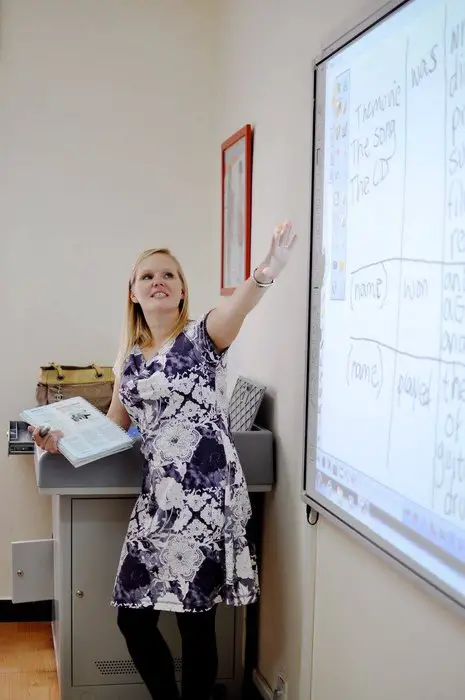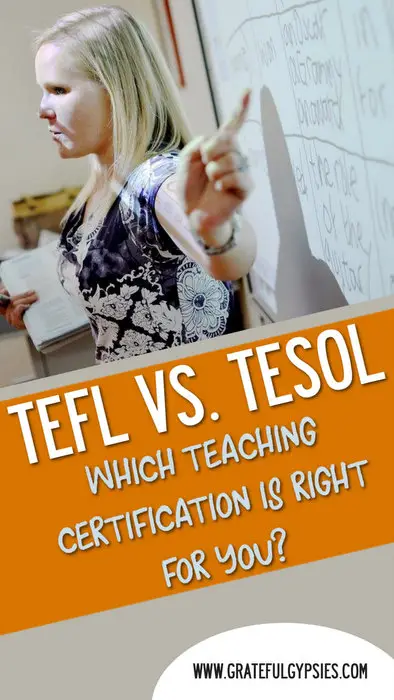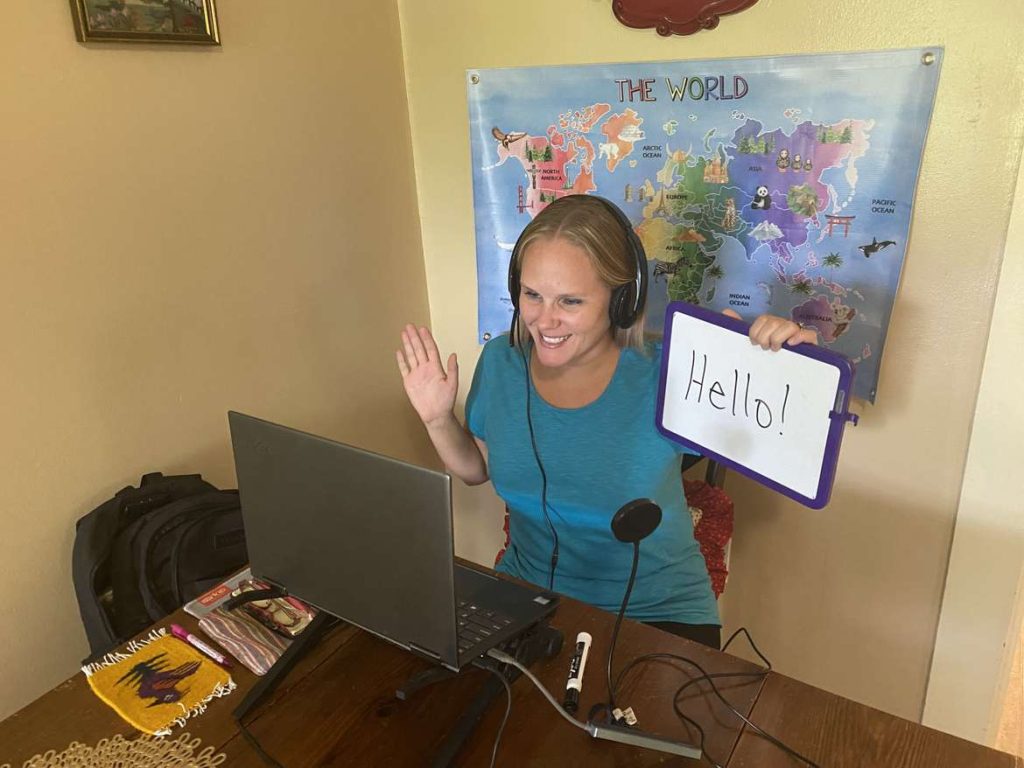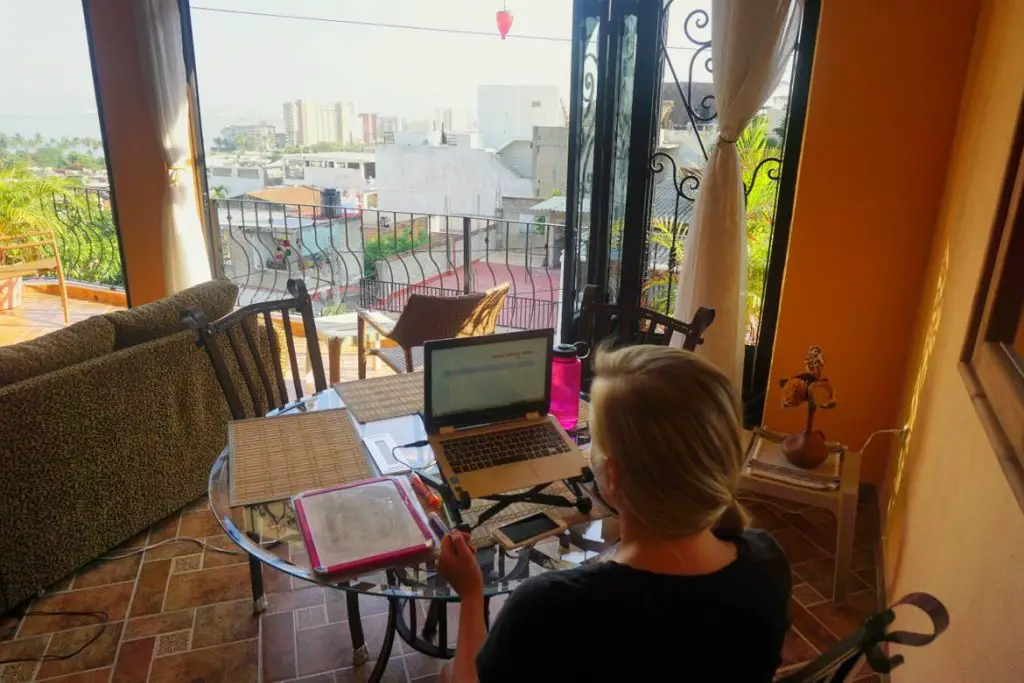The world of ESL can be confusing with all the acronyms that get tossed around.
What does it all mean?! TEFL vs. TESOL vs CELTA, what’s the difference? Which teaching certification is the right one for you?
Just doing a quick Google search for your answers can make you want to pull your hair out.
Don’t worry! I’ve totally been in your position before and I feel your pain. After extensive research, I think I’ve got a grasp on it. I’m going to try and put your worried mind at ease with this post. It lists in detail the difference between a TEFL Certification, TESOL Certification, and a CELTA Certification to help you decide which teaching certification is best for you.
Let’s dive in!
Pin It For Later!

(Click the Pinterest share button for the full-size pin!)
What You’ll Learn in a Teaching Certification Course
You’ll learn how to create better lessons, manage a class, get shy students to speak up, and entertain while teaching in an English teaching certification course. I wish I had had a certification when I arrived to teach English in China.
My first demo class was a total disaster. It was at a kindergarten in Beijing. Sasha had actually applied for the job but then got his old job back, so he passed this one along to me. I had not yet taught a class of 40+ kids. I was just a little nervous.
He gave me a few pointers on how to teach a demo class, but when it came time to do it I was literally shaking. Needless to say, it didn’t go so well. I spoke so fast, had no idea what I was doing, and the kids all looked super confused when it was finished. It was awful!
Afterward, the principal told the recruiter that I was no good and that she needed to find another teacher. The recruiter responded by saying in more or less words, “Well this teacher is here now and you need a teacher now. I’m sure she can figure it out. Give her a chance!”
And that’s how I got my first job in China.
If I had gotten a teaching certification, this embarrassing demo class would have never happened. If you want to avoid a similar situation, you should definitely take a course.

TEFL vs. TESOL vs. CELTA
First, let’s start by deciphering all these acronyms.
What does TEFL stand for?
TEFL stands for: Teaching English as a Foreign Language
This is the acronym you’ll probably see the most in the ESL world. This is the certificate you want to get if you’re planning to teach English in a country where it is not the native language such as China, Cambodia, or Oman.
What does TESOL stand for?
TESOL stands for: Teaching English to Students of Other Languages OR Teaching English to Speakers of Other Languages
As they would say in Southeast Asia, “Same same but different, ya?!“
A TESOL certificate is primarily for teachers who teach English to non-native speaking students in English-speaking countries. For example, teaching a group of students from Saudi Arabia who immigrated to the USA (what Sasha did during our brief stint in Murfreesboro, TN). So if you were to get your certificate through a course at a local university in the US, Canada, the UK, or Australia, it would most likely be a TESOL certificate.
TEFL and TESOL are used interchangeably in the ESL world and have both come to mean the same thing to many people.
For the purpose of this post, we’ll stick to TEFL as it’s the one meant for teaching English abroad, and that’s what we advocate.
What does CELTA stand for?
CELTA used to stand for: Certificate in English Langauge Teaching to Adults
But they changed it to stand for Certificate in Teaching English to Speakers of Other Languages. Perhaps they realized they were pigeonholing themselves by having “adults” in the name. The techniques you learn can definitely be applied to all ages of English learners.
Here’s one way to think about it; if TESOL is the product, then CELTA is a specific brand of that product. A CELTA certificate is awarded by the University of Cambridge.

How to Get a CELTA Certification
To get a CELTA Certification, you have to go to one of their approved teaching centers around the world. As I mentioned above, the certificate is awarded by Cambridge University.
The course is 4-5 weeks long and rather than learn the material and take a final exam, the trainees are continually assessed and then awarded a certificate qualification. The Cambridge English Language Assessment appoints assessors who are always present to moderate the course. Because of this, a CELTA is viewed as a prestigious certification as employers know that the course had to cover certain requirements.
A CELTA course usually costs anywhere from $1,500 – $4,000. If there’s not an approved center in your area, you’ll have to travel to the nearest one for your training. Keep in mind that you’ll have to cover your own housing and food expenses, which adds to the cost.
This could be a great opportunity to see how you like living abroad. I have friends who traveled to different parts of Europe to do their CELTA and have fond memories of their time. They made really great friends in their class that they still keep in touch with. When you’re spending 100+ hours with the same people, you’re bound to get to know them pretty well and make long-lasting friends.
If you’ve ever read somewhere online that you have to have a CELTA to teach ESL, that is simply not true. There are many TEFL courses that meet or even exceed the requirements of a CELTA.
CELTAs are ideal for people who want to make a career out of teaching abroad. Unless you’re planning on doing some serious long-term teaching, you probably don’t need to make the financial commitment a CELTA course demands. Instead, you should look into other TEFL courses.

How to Get a TEFL Certification
In-Person TEFL Course
The first way is to take an in-person course. These courses can range anywhere from an intensive full-time course or a slightly less intensive part-time course. Remember, you should choose a course that has at least 100 hours of training and coursework. In a full-time program, this would take about 4 weeks. A part-time course would take 2-3 months.
You will likely find a TEFL course being offered at your local university or community college if you’re an American. It’s also possible to take a course abroad in Thailand or Argentina. I’m sure it’s easy to find courses in other English speaking countries such as Canada, England, and Australia. The cost can range anywhere from $990 – $3,000 for an onsite course.
Be sure to do your homework about TEFL courses in other countries. Read reviews and ask any questions about what is offered in the course. Not all TEFL courses are created equal. In that same vein, don’t automatically assume that all TEFL courses are a scam. There are plenty of great courses out there, you just have to find them.
Online TEFL Courses
You can also do an online TEFL course. These are much more flexible and better suited for people who are currently working a full-time job or just don’t have the money to splurge on an onsite course. You could even do it while you’re finishing up your degree. That way you’ll be ready to apply for jobs upon graduation.
It’s by far the most affordable option. You can expect to pay around $300 – $500.
By getting a TEFL certificate online, you can take your time and really study the materials. Or you can finish it in a few days. Choose your own adventure! You could even do it while you’re teaching part-time on a tourist visa in order to give yourself the necessary qualifications to qualify for a proper working visa.
Just like with an onsite TEFL course, you have to be diligent in choosing the best online course. There are a lot of scams out there that will give you a certificate that won’t be recognized by schools or training centers.

Accredited TEFL Courses Online
I’ve been doing a lot of research into online TEFL courses to try and suss out the best ones out there and I think I’ve found them!
BridgeTEFL
Sasha and I got our online TEFL certificates with BridgeTEFL and we highly recommend them. Before taking this course, I had no idea what I was doing in the classroom. I was literally improvising. Their course gave me so many new ideas and ways to structure my lesson.
BridgeTEFL is the largest provider of TEFL certification training in the United States with over 4000 graduates every year. With nearly 30 years of experience in TEFL, they have helped thousands of teachers realize their dreams of teaching overseas and now also online. Their accrediting body is ACCET – a US Department of Education Recognized Agency.
They offer multiple course options including:
- 100-hour Professional Certificate (full core curriculum + grammar certification)
- 120-hour Master TEFL Certificate (full core curriculum + grammar certification + endorsements in Teaching Young Learners and Teaching Business English + teaching resources)
- 150-hour IDELT (International Diploma in English Language Teaching) Certificate
One of the best parts of their online course is the personal tutor. They are there to grade your assignments and help you out if there’s something you just can’t understand. There are video tutorials and they even have job resources built into the course.
Furthermore, you can add a specialized certification such as Teaching Business English or Teaching English Online. The latter is perfect for those hoping to become digital nomads by teaching English online.
Click the button below to learn more about their courses!

myTEFL
Another great online TEFL certification organization I’ve found is myTEFL.
They tick all the boxes: they offer a 120-hour course, they’re accredited, and they have a 4.78 rating on TEFL Course Review, a 98% rating on GoOverseas.com, and a 9.9 overall rating on GoAbraod.com.
In addition to all that awesomeness, they’ll help place you in a job in multiple countries across the world – including Thailand, China, Indonesia, and Vietnam – once you finish your course.
If all that wasn’t enough, a portion of the payment of all courses purchased is donated to a charity. Getting your TEFL certification with myTEFL helps the world in more ways than one.
We’ve partnered with them to provide a 35% discount for our readers on all their courses! Just enter the code gypsies35 at checkout.
Click the button below to learn about myTEFL!
Click here to read an in-depth review of both BridgeTEFL and myTEFL!
Conclusion
Whether you want to teach in China, Thailand, Kazakhstan, or anywhere else, getting an English teaching certification will make you better prepared, more confident, and ready to take on anything the ESL classroom throws at you (figuratively, not literally).
Getting a teaching certification is extremely beneficial. Getting a TEFL certificate helped Sasha and me get a teaching job at Wall Street English, the most well-known English training center in China. It will also make you more competitive when applying for online teaching jobs such as VIPKID. There’s certainly no downside to getting a teaching certification.
Hopefully, this post has put to rest some of the confusion and frustrations surrounding which certification is best for you. If I’ve helped you in some way, please leave a comment and let me know! Also, feel free to put any questions you may still have in the comments.
Thanks for reading!
Like It? Pin It!

Which certification is the best for you? Tell me in the comments!
This post may contain affiliate links. If you purchase something through our link we will earn a commission at no extra cost to you! The earnings go towards running this site. Thank you for your support! We only recommend products we have personally used and trust.




Hello Rachel,
Just took a quick peek at a few listed TEFL jobs on BridgeTEFL (I would like to do online teaching only but I happened to look into the first few that were in class), and it seems a 4 year degree is also required. Is this the norm? I don’t have a 4 yr degree and would hate to invest in time and money on a certificate that may render useless. Also could not find the info indicating if BridgeTefl’s certificate is lifelong. Thanks!
Hi Alexandra! Bridge TEFL certificates are all lifelong. Most online teaching companies do require a Bachelor’s Degree but some of them don’t. However, they don’t pay as well. I found one company called Acadsoc that doesn’t list that as a requirement but I don’t know anything about them. I totally get not wanting to invest in something that could be useless so always do your research first. Hope this helps! Feel free to reach out if you have other questions!
Thank you! Have a great year!
Hi. I am enjoying your blog and am trying to figure out the world of ESL. I see that you got your online certification through bridge TEFL, but that you recommend mytefl as well. Which would you say you recommend more? These are the two certifications that I have been looking into & I’m trying to decide if the more expensive option with Bridge TEFL is actually worth it. Thanks, Chris
Hello! I saw the same ad on fb. I am very interested to take the course but, I’d like to know if the certificate has an expiration. Also, I’d like to know if the discount is until when. Thanks!:)
Hi, Kizzy! Thanks for reaching out! Neither the certificate nor the discount have an expiration. Let me know if I can help in any other way!?
I would also like to know if in case, I won’t be able to pass the course, is it probable to take the course again?
I really like to take it while I still can. Thanks! 🙂
I’m sure you could but you likely won’t need to. It’s not a difficult thing to pass ?
Thanks for the encouragement. I’ll do my best then. Thank you! 😀
You’re so welcome!
Hello!
I am definitely interested in getting my TEFL certification, but it’s mind-boggling how many different companies say they provide the same level of education. I feel like I can’t be sure if the one to go with is actually accredited, or if they’re just saying that they are… and there aren’t really any ways to check if the accreditor is legitimate, you know? Do you have any advice about this? I’d appreciate it!
Also, I found a course that’s 160 hours which is very appealing, but people are telling me that if they don’t have a face-to-face learning component to their curriculum that it isn’t worth it. The thing is, I can’t really find a company that will do that on-line (I’m in Alaska… I really don’t want to drive all the way to Anchorage for a class, you know?). I’m kind of willing to forgo this bit of advice: I’ve already successfully taught in China for a year, and now I’m with VIPKID (like your husband) and have completed my first contract. I’m no stranger to ESL teaching. ^_^
Any advice you have would be welcome! Best, RC
Thanks for reaching out! I totally agree that the number of companies out there are mind-boggling! And sadly, there are many who claim to be accredited when they are not. One way to find out would be to head to the website of the accrediting organization. It can sometimes be easy to tell from the website whether or not it’s legit. Other than that you can always check review forums and websites. That’s really the best advice I can offer on that front. This article has the 7 best online TEFL courses and GoAbroad is an independent website so I don’t think they have anything to gain from recommending these courses: https://www.goabroad.com/articles/tefl-courses/7-best-online-tefl-courses
I don’t blame you for not wanting to drive all the way to Anchorage for a class. I think the face-to-face component is only important for people who don’t have much teaching experience. As you’ve already taught in China and with VIPKID, I don’t think that part is necessary for you. I had already been teaching in China for a year when I got my online certification with Bridge TEFL. It didn’t have the face-to-face component and I still felt like a got a ton of value from it. I personally think a 160 course would be overkill and a bit unnecessary. All companies and schools will accept a 120-hour course completion. I hope this helps! Let me know if you have other questions 🙂
Hi Rachel
I am from Belgium and would like to obtain a TEFL Certificate. Do you know if it is possible as a non-native English speaker to get certified and to get placed in a job?
Thanks for your reply.
Cheers Edwin
Hi, Edwin! It’s definitely possible for non-native speakers to get a TEFL and be placed in a job. Having a TEFL certificate will make you more competitive than other non-native speakers, too. There are some countries (such as China) that make it more difficult for non-native speakers to get a working visa to teach English but it’s still possible. It all depends on where you want to go. My TEFL has a placement program for graduates. I’m sure they’ll be able to help you out!
Thanks for your comment! Any other questions, just let me know 🙂